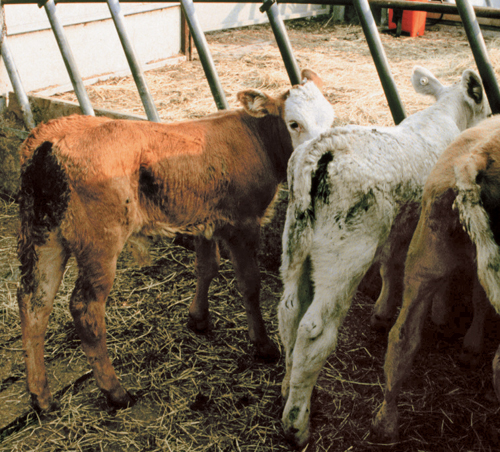Difference between revisions of "Cattle Medicine Q&A 04"
| (One intermediate revision by one other user not shown) | |
(No difference)
| |
Latest revision as of 15:24, 2 September 2011
| This question was provided by Manson Publishing as part of the OVAL Project. See more Cattle questions |
During hot summer weather you are presented with a group of 3-month-old single suckled beef calves that have been grazing a 25 hectare field. The only water supply is a small stream which has almost dried up; there is a lot of poaching and faecal contamination of the ground surrounding the edges of the stream. Several calves have profuse diarrhoea, containing mucus and small flecks of fresh blood, with considerable staining of the perineum and tail. Tenesmus with partial eversion of the rectum is observed in two calves. The clinical signs are less marked in the remaining calves where chronic wasting and poor appetite are the presenting signs. The rectal temperatures are normal.
| Question | Answer | Article | |
| What conditions would you consider? (Most likely first.) | The most likely conditions to consider include: coccidiosis (Eimeria alabamensis); salmonellosis; PGE (ostertigosis type I); lead poisoning; ragwort poisoning. If only one calf was affected then one could also consider intussusception and necrotic enteritis |
Link to Article | |
| How could you confirm your diagnosis? | A diagnosis of coccidiosis can be made based upon clinical findings and supported by a high oocyst count in the faecal samples collected from six calves. Faecal oocyst counts can be highly variable and Eimeria speciation should be undertaken. Response to treatment is also a helpful indirect diagnostic aid. |
Link to Article | |
| What treatment(s) would you recommend? | The treatment is diclazuril administered to all calves. Multivitamin injections may help convalescence in debilitated calves. |
Link to Article | |
| What control measures could be adopted? | Control measures include moving the cows and calves from the infected pastures to another field. Advice should be given about installing a mains water supply. In pastured cattle during hot dry summer weather, reliance on small streams to provide water can lead to rapid faecal contamination of the water/surrounding pasture causing clinical coccidiosis in susceptible calves. |
Link to Article | |
